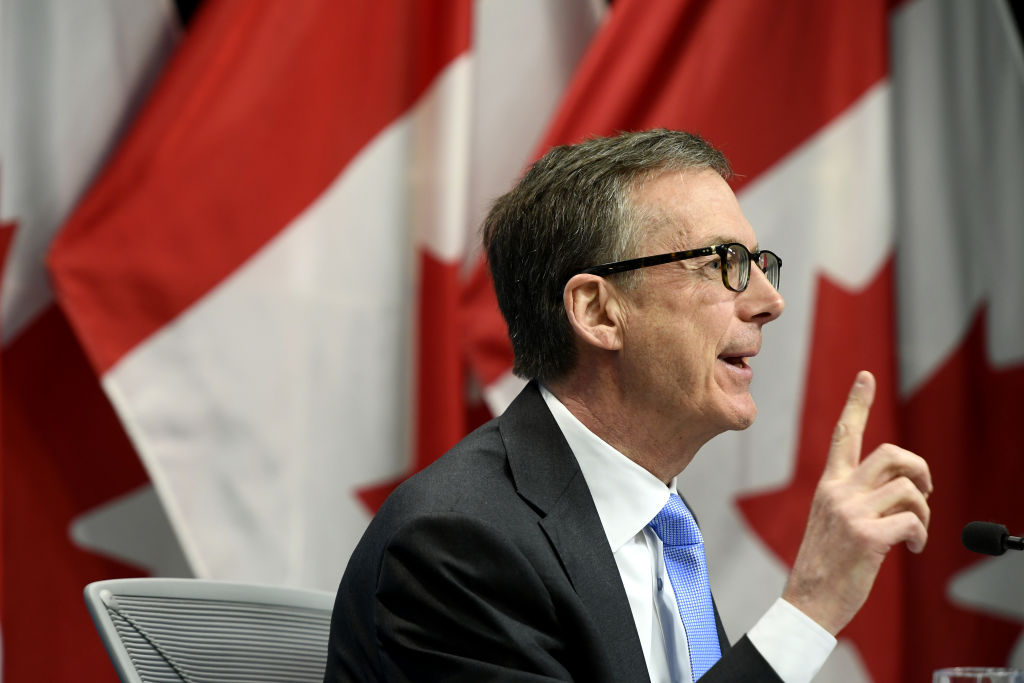While the Bank of Canada is currently still forecasting a “soft landing” for the Canadian economy, it’s going to take higher interest rates to help that happen.
That was according to comments from Bank of Canada Governor Tiff Macklem, who spoke during a press conference following the release of the Bank’s Financial System Review (FSR)on Thursday.
“We think the economy needs higher interest rates, and it can certainly handle higher interest rates,” he told reporters.
He noted that rate hikes are needed to remove the “excess demand” in the economy and to tame spending.
When asked if the Bank would go so far as to purposely induce a recession to cool demand, Macklem only said the Bank doesn’t want to “over-cool the economy.”
For some, this simply reaffirmed what the Bank has already made clear, that controlling inflation is its number one concern right now.
“While household debt and housing are a concern for policymakers, inflation is driving the policy bus for now,” wrote BMO economists. “That focus will likely come under increasing stress in the coming months as policy rates are pushed consistently higher. There’s nothing in this FSR to suggest the BoC will back off its aggressive policy stance.”
BoC open to larger rates hikes if needed
While a 75-basis-point rate increase in July was always a possibility—particularly after the BoC said last week that it’s prepared to act “more forcefully” to bring inflation under control—Macklem delivered additional comments that caused markets to raise the odds of such an oversized rate hike.
“We may need to take more interest rate steps to get inflation back to target,” he said during Thursday’s press conference. “Or we may need to move more quickly, we may need to take a larger step.”
Rate expert Rob McLister noted that OIS market probability of a 75-bps rate hike in July rose to 50% following that comment.
“Central bankers don’t make such statements loosely,” he tweeted.
The BoC has made clear that its objective to quickly get the policy rate back to neutral, which is between 2% and 3%. As noted in a previous post, markets are now anticipating half-point rate hikes at each of the next three policy meetings.
Highly indebted households are “especially vulnerable”
While indebtedness has increased among all households, the Bank of Canada noted that highly indebted households are at the most risk as rates continue to rise.
“Households across different levels of indebtedness have generally increased their holdings of liquid assets relative to 2019, adding to their financial resilience,” reads the Bank’s Financial System Review. “However, the Bank estimates that the increase in liquidity buffers during the pandemic is smallest for highly indebted households.”
This includes many first-time homebuyers, who have put their extra pandemic savings toward their down payment.

For those who purchased a home in 2020 and 2021 with a 5-year term, the Bank estimates their renewal in 2025-26 will be 30% higher. For those with a high loan-to-income in a variable-rate mortgage, the Bank estimates they will see payments rise by 45% five years from now.
“These households will see the largest rate increase because they took out a mortgage when rates were at or near record lows,” the Bank said. “This is particularly true of the historically large number of households that opted for variable-rate mortgages.”
The Bank estimates that over 18% of uninsured borrowers (those with a down payment of over 20%) with a loan-to-income ratio above 450% currently have a variable rate.
Potential increases in monthly mortgage payments at renewal
| # of mortgages subject to a rate increase | Median monthly payment at origination | Median monthly payment at renewal | Median monthly payment change | |
| All mortgages originated in 2020-21 | 1,400,000 | $1,390 | $1,810 | +$420 (+30%) |
| High-ratio mortgages originated in 2020-21 | 300,000 | $2,080 | $2,840 | +$760 (+37%) |
| Fixed-rate mortgages originated in 2020-21 | 860,000 | $1,260 | $1,560 | +$300 (+24%) |
| High-ratio fixed-rate mortgages originated in 2020-21 | 140,000 | $1,880 | $2,370 | +$490 (+26%) |
| Variable-rate mortgages originated in 2020-21 | 540,000 | $1,650 | $2,370 | +$720 (+44%) |
| High-ratio variable-rate mortgages originated in 2020-21 | 170,000 | $2,260 | $3,280 | +$1,020 (+45%) |
Feature image by Justin Tang/Bloomberg via Getty Images


